The best time to start a podcast is now. Whether you want to start a company-branded podcast or you want to share your thoughts, free podcast hosting can be a good way to start.
Free podcast hosting can give you a low-cost way to experiment with podcasting and build an audience before making a lengthy financial commitment.
In this article, we’ve compiled a list of your best options for a feature-rich experience that doesn’t empty your wallet. Not only do we consider storage and bandwidth but also the enhanced features like analytics and distribution that will help you grow an audience quickly.
 Table of contents:
Table of contents:
Why do I need podcast hosting?
It would be wonderful if you could just upload your podcast to Apple or Spotify and then wait for your audience to grow. Unfortunately, it’s not that simple.
In the same way that Google doesn’t store any websites, Apple doesn’t store any podcasts. A podcast host does all the heavy lifting. They store it. And they use RSS feeds to let the directories know when episodes are released. Finally, when your audience clicks play, your podcast host is the one sending files all over the world.
There’s a reason why Apple and Spotify want to avoid all this hard work and this file size calculator reveals it.
If audio is uncompressed and uses a high bit rate, then five minutes of speaking can take as much as 106 MB in storage. That better be the best five minutes of your audience’s life because Apple, for one, limits podcasts to 150 MB.
Specialized podcast hosts have the tools and the technology to store large audio sizes and deliver fast data transfers without crashing servers or buffering endlessly.
How does free podcast hosting work?
Given they offer all of these benefits, you might be wondering how they can offer them for free?
Most free plans will offer limited storage and bandwidth. Your podcast host knows that when your audience starts to grow, you will upgrade to a paid plan for the increased storage and bandwidth.
Another option gaining traction is revenue-sharing. Podcast advertising is predicted to reach the billion-dollar mark by the end of 2020 because it has a high conversion rate, 63% of listeners made a purchase after hearing podcast ads.
This is notable because a number of podcast hosts are growing their ad networks and offering to split the advertising revenue with creators. This means, in some cases, you can get unlimited, high-quality hosting without reaching for your wallet.
Best free podcast hosting on the market
Now that we’ve discussed the value of free podcast hosting, let’s look at six excellent alternatives. The one that’s the best fit for you will at least partly depend on what your long-term goals are, but they all offer an excellent way to experiment with podcasting.
1. Anchor

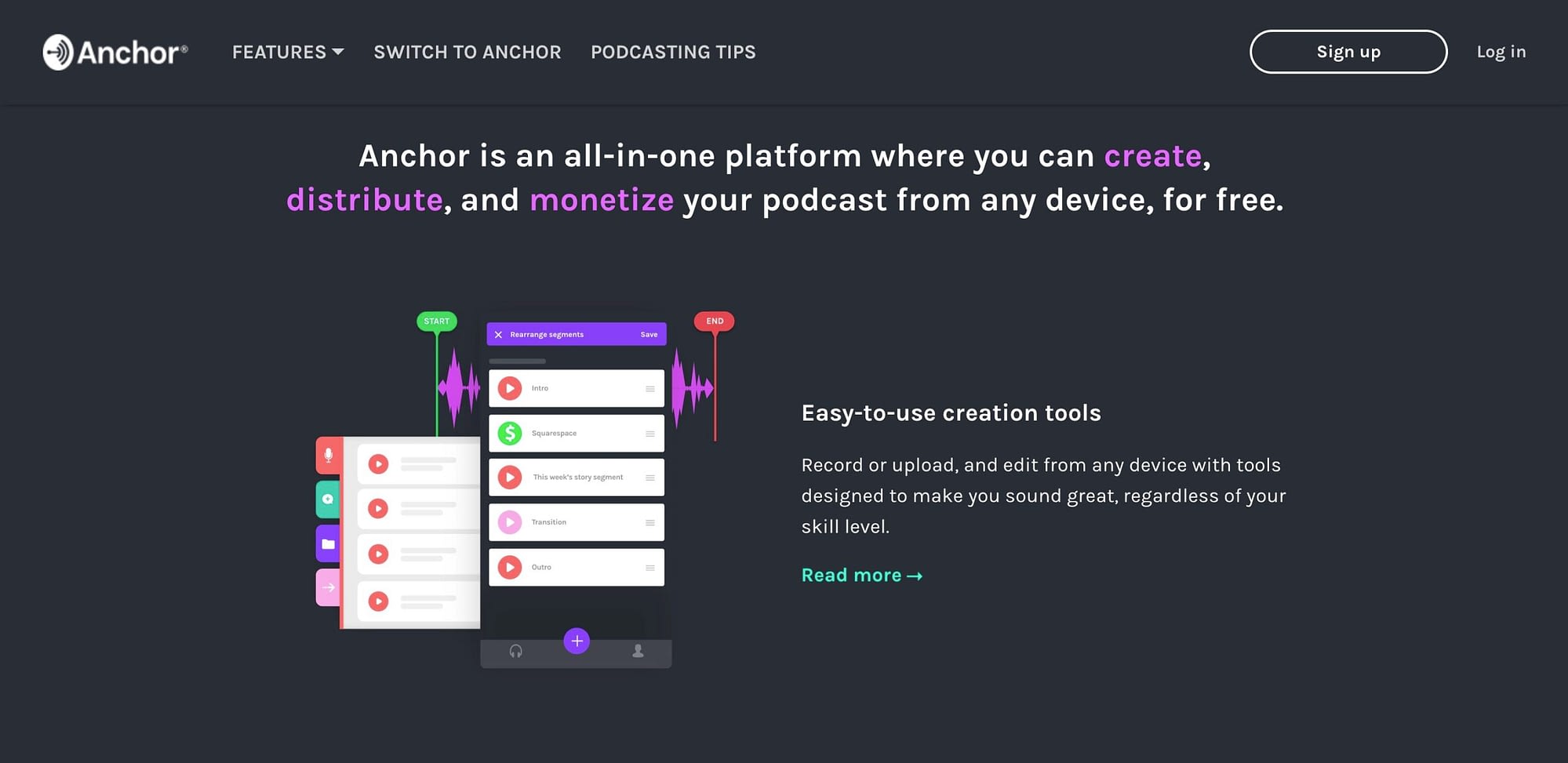
- # of episodes/storage: Unlimited
- # of podcasts: 1
- Outbound bandwidth: Unlimited
- Website:

- Monetization:
 (the US only)
(the US only) - Distribution:
 one-click distribution
one-click distribution
Anchor has only one hosting plan and it offers unlimited everything. Normally, a business that only offers free plans isn’t likely to be a business much longer, however, Anchor joined the Spotify family in 2019. I think they’ll be ok.
Besides financial security, one of Spotify’s great benefits is its innovative advertising network. Anchor leverages this network to offer free podcast hosting with a revenue share model that splits everything 30-70 in your favor.
Equally important for the emerging podcaster is Anchor’s advanced analytics. In contrast with other hosts, Anchor offers detailed analytics on audience drop-off, demographics, and even preferred platforms. If you plan to experiment with formats and styles, then these analytics will tell you which version of your show is going to be a hit.
On the other hand, Anchor doesn’t offer a website or a custom domain. If you want to market your podcast, then you will need to use a podcast page hosted on www.anchor.fm/yourname.
Who should pick Anchor?
The Experimenter
- You’d like to try different things to see what works.
- Great analytics like listener drop-off will help you perfect your show.
- Built-in recording options with a drag-and-drop editor.
2. Buzzsprout

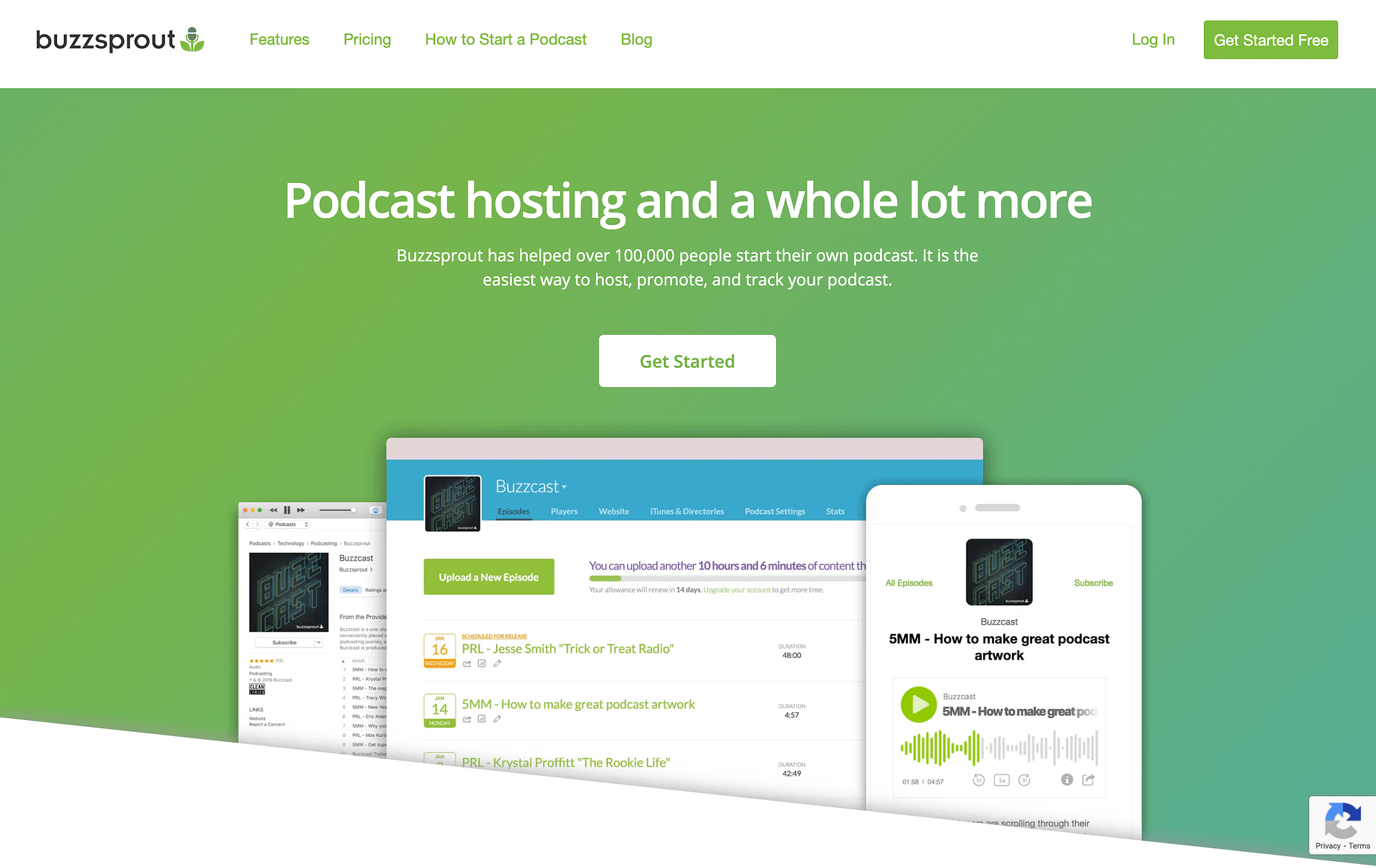
- # of episodes/storage: 2 hours/mo for 90 days
- # of podcasts: 1
- Outbound bandwidth: 250 GB
- Website:
 (with ads)
(with ads) - Analytics: Basic (listens and downloads)
- Monetization:

- Distribution:

Buzzsprout is one of the most popular podcast hosts with over 10 years and 100,000 customers on their books. The first thing to remember is that the storage is quite low. For this reason, Buzzsprout is well-suited to podcasters on the verge of upgrading.
On the positive side, the automatic file conversion will keep beginners happy. Essentially, you can throw any file at Buzzsprout and it will be automatically converted and optimized for the podcast directories.
While Buzzsprout offers limited analytics, they do provide a growing range of integrations for extended features like analytics, charting, audio recording, WordPress publishing, alongside their own API.
Finally, you should consider Buzzsprout if you want to learn about monetization options. Not only do they have a growing library, but they also offer a slice of sponsorship, donation, and affiliate marketing to all users.
Who should pick Buzzsprout?
The Ambitious Podcaster
- You’re ready to monetize a growing following.
- You like automatic audio optimization that includes bitrates and ID3.
- You’d like to use a custom domain.
3. Sounder.fm

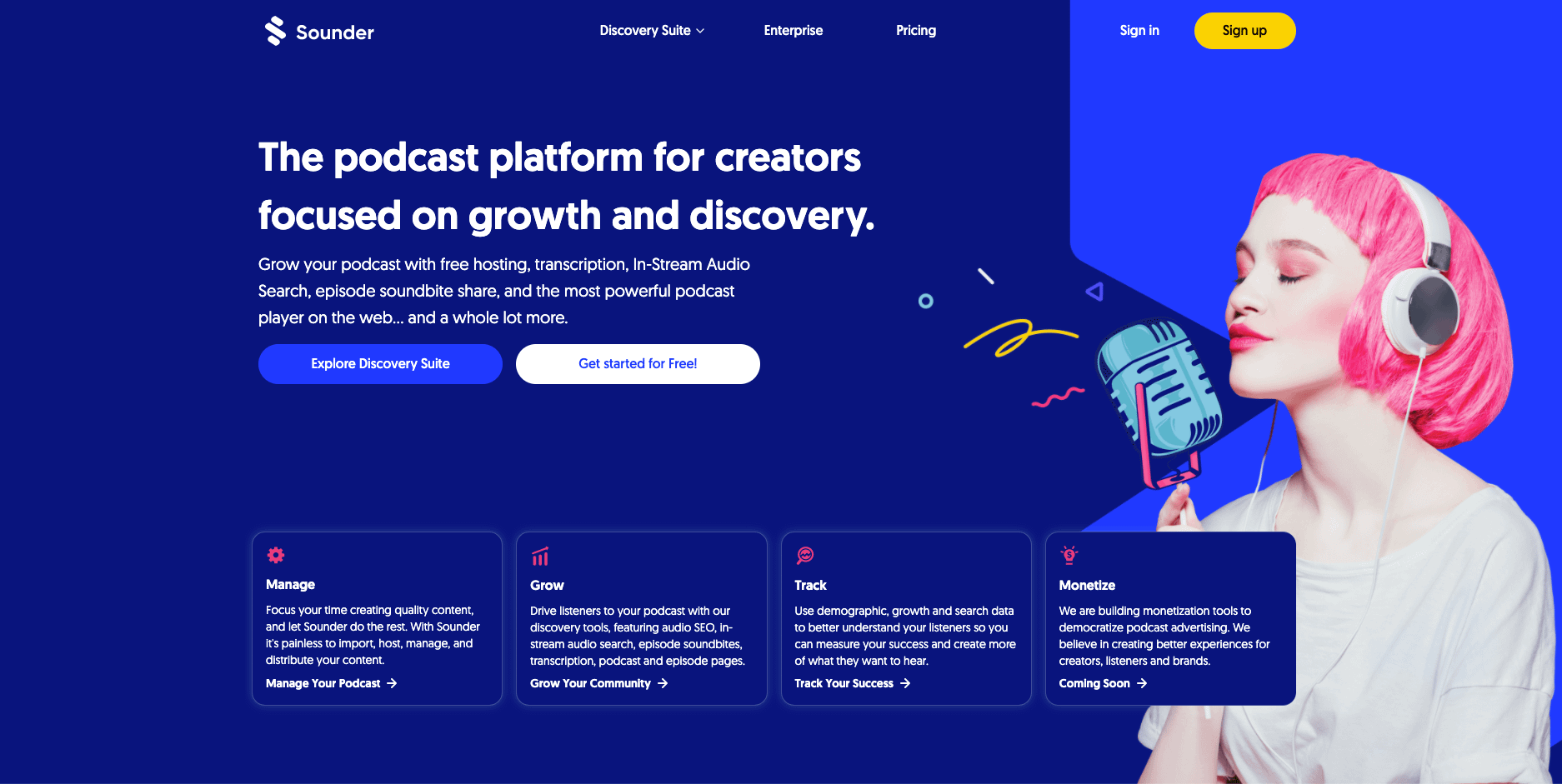
- # of episodes/storage: Unlimited
- # of podcasts: 1
- Outbound bandwidth: 20k streams/mo
- Website:
 (with ads)
(with ads) - Analytics: Basic (listens and downloads)
- Monetization:

- Distribution:

Sounder.fm is the youngest business started by the ubiquitous former Google and Spotify executives. Founded in 2019, they are the youngest hosting company to make the list, but they are growing quickly.
We included them in the list because they have a strong SEO focus. As just one illustration, they offer automatic transcriptions in their free plan. In fact, the transcription will be hosted on your podcast page to increase your show’s discoverability.
If you like to use tracking tools, like Google Analytics or Facebook Pixel, then you will be able to integrate them seamlessly with Sounder.fm.
Who should pick Sounder.fm?
The Beginner
- You’re not sure if it’ll work out but you want to give podcasting a shot.
- Share small audio snippets with the Soundbite audio share feature.
- Built-in automatic transcription for improved SEO.
4. Podbean

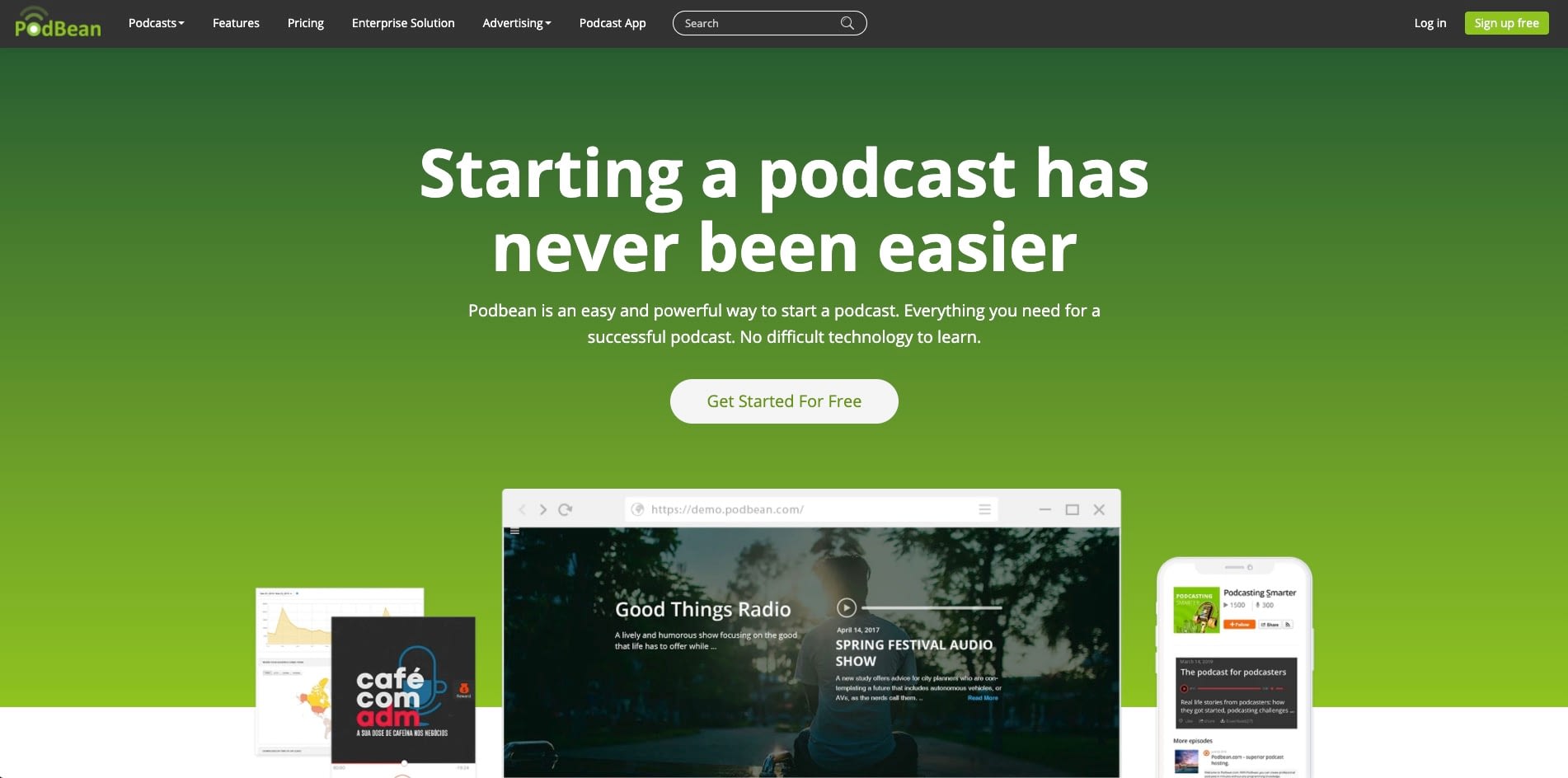
- # of episodes/storage: 5 hours (500 MB)
- # of podcasts: 1
- Outbound bandwidth: 100 GB
- Website:
 (with ads)
(with ads) - Analytics: Basic (listens and downloads)
- Monetization:

- Distribution:

If you’d like to use free podcast hosting without spending too much time on the details, then Podbean is a superb option for you.
Not only do Podbean offer a website with basic themes, but they also limit the free plan to mp3 files at 128 kbps. Although the maximum file size is 100 MB, you can publish three times a day.
Furthermore, you can use a range of plugins for automating basic tasks. There’s everything from Google Analytics, email marketing, meta tags to video, and audio optimization.
Who should pick Podbean?
The Hobbyist
- You’re in it for the fun and not necessarily looking to scale.
- Guests can “call in” using the free Podbean app.
- Listed in the Podbean app with over a million active users.
5. Spreaker

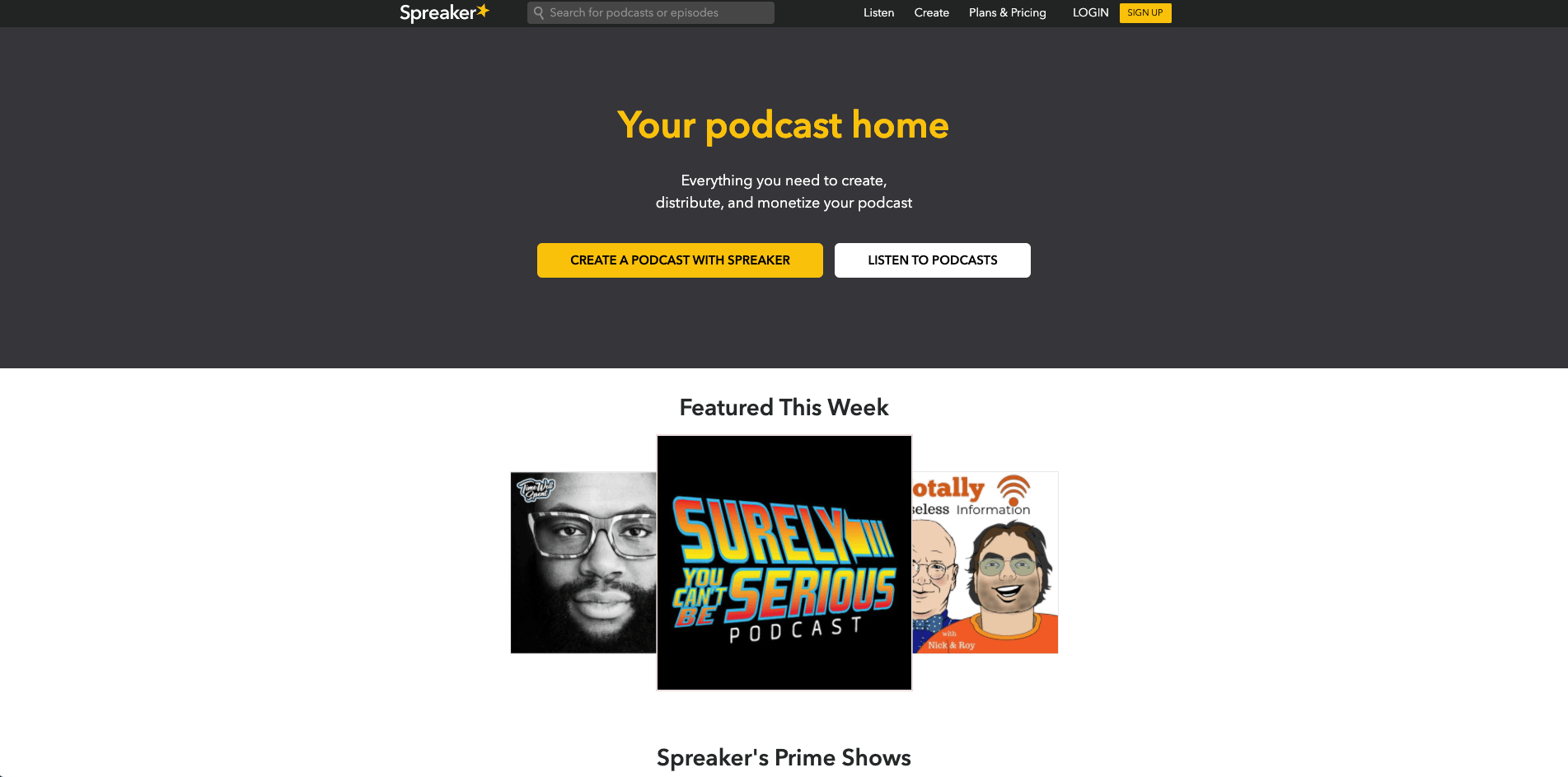
- # of episodes/storage: 5 hours (500 MB)
- # of podcasts: Multiple
- Outbound bandwidth: Unlimited
- Website:

- Analytics: Basic (listens and downloads)
- Monetization:

- Distribution:

Spreaker is the only host on the list to offer multiple podcasts on the free plan. Equally important is the unlimited bandwidth, which is a perfect mix for tinkerers.
I also like the range of soundtrack options available through their partnerships and libraries. Of course, you will have to pay for jingles and licensed music, but the range is terrific.
If you would like to try some live podcasting, then Spreaker’s free plan is a solid option with 15 live minutes per podcast. Although they don’t offer a website, you can easily share audio snippets directly from your podcast page.
Who should go for Speaker?
The Rambler
- You want to make multiple podcasts and try different things.
- The audio library makes it easy to find auxiliary sounds.
- One-click sharing to connected social media accounts.
6. Acast

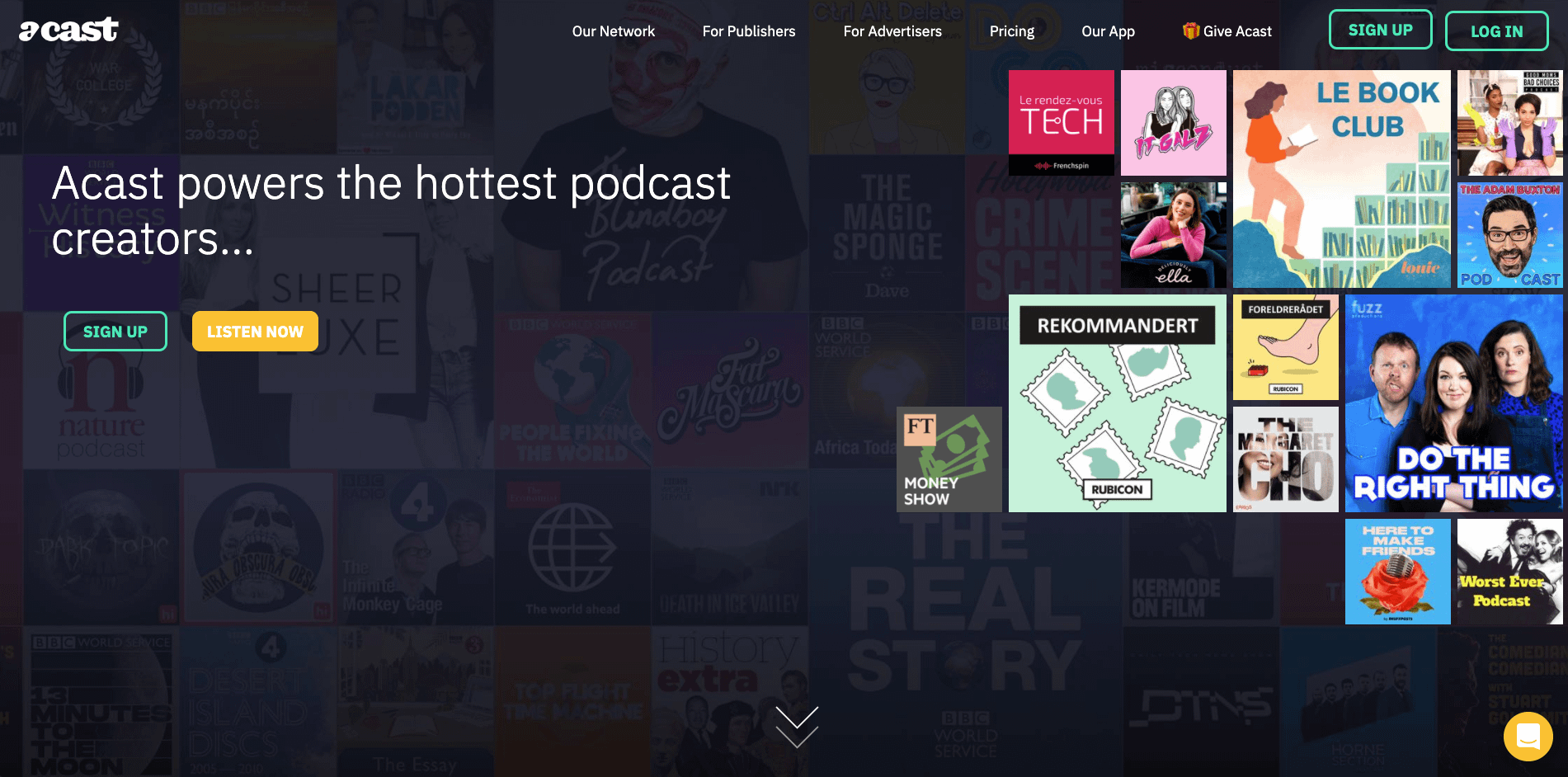
- of episodes/storage: Unlimited
- # of podcasts: 1
- Outbound bandwidth: Unlimited
- Website:
 (with ads)
(with ads) - Analytics: Basic
- Monetization:

- Distribution:

If you want to start with a big host, then Acast is your option. Not only is it the choice of The Guardian and The BBC, but also most of the winners at every British Podcast Awards.
While Acast offer an unlimited service for all of their users, monetization is for paid users only. On the other hand, free users get marketing tools like the transcription service and Snipper for creating small audio-visual clips that are perfect for social media.
On the negative side, Acast’s free website only allows for basic color and button styling. Moreover, they don’t support custom domains in their free or paid plans.
Who should choose Acast?
The Next Big Thing
- You know your podcast will be huge and you want professional hosting.
- Create small audio-visual clips for sharing with the Snipper tool.
- One-click transcription is available.
What should you look for with a free podcast host?
Storage size: One of the most important considerations. We’d recommend free podcast hosting that offers a minimum of 500 MB storage. This will give you room for at least three episodes at 150 MB. Even a small archive is a good step towards building an audience.
Outbound bandwidth: Keep in mind that just 10 listeners committing to an hour-long podcast at 128kbps will use 562 MB bandwidth. You need at least 250 GB of outbound bandwidth.
Analytics: The more advanced analytics the better. Advanced analytics will help you fine-tune your show with extra details like listener drop-off and demographics.
File types and bit rates: Unfortunately, the podcast directories have different requirements, so, in the beginning, opt for a podcast host who only supports MP3 and M4A or offers automated optimization and conversion.
Distribution: Your podcast should automatically provide you with an RSS feed for sharing with podcast directories. It is nice to have a podcast host who automatically distributes your episodes to the major directories.
Extra tools and integrations: Building your audience will be a lot easier with marketing tools like Sendinblue or one-click social sharing of audio highlights.
Website and pages: The best free podcast hosting options will give you a dedicated site or page where people can listen to your archive using a web player.
Which free podcast host is for you?
As can be seen, free podcast hosting offers a great way to lower the costs of podcasting without sacrificing quality. While you might be tempted to opt for a host who offers revenue sharing, ultimately you should consider whether the same host can help you build your audience.
In other words, consider what you would like to achieve and pick free podcast hosting based on your needs:
If you would like an easy to record your podcast and experiment with multiple styles, then choose Anchor.
For the best learning and marketing options, it’s hard to pass up Buzzsprout’s tools and documentation.
If you would like to build your audience through SEO tools, then take advantage of the automated transcription from Sounder.fm.
If you would like to have fun and leave everything on autopilot, then take advantage of Podbean’s automation options.
For multiple shows, and live podcasting then Spreaker is your best option.
If you would like to not only marketing tools but also a well-known host, then opt for Acast.
Have any questions about these podcast hosts? Ask away in the comments section!
The post 6 Free Podcast Hosting Services for Starting a Podcast Today appeared first on Revive Social.

